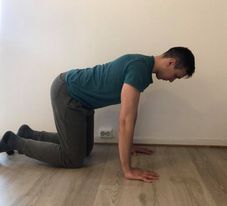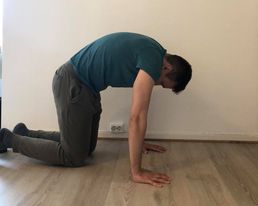Best Paraspinal Muscle Spasm Exercises for Pain Relief
What Are The Best Paraspinal Muscle Spasm Exercises?
Some of the most effective paraspinal muscle spasm exercises are very simple stretching exercises that reduce the activity of spinal muscles. Reducing muscle tension and improving blood circulation will diminish the pain in the lower back and improve the range of motion.
Having a muscle spasm and pain creates a certain level of pain and discomfort. Someone experience low-intensity pain, while someone ends up with unbearable pain, unfortunately.
Because of that, you need to be careful when exercising with intense pain.
How to determine pain level?
Using a scale from 1 – 10, you can get a clue about your pain intensity. If your answer is between 1 – 3, then you have low-intensity pain. Going further from 4 – 7, you are in a moderate pain zone. Going above that, you are in the red zone and should be careful with exercising.
This is a subjective way to estimate pain intensity.
15 Best Paraspinal Muscle Spasm Exercises
Here is the list of 15 exercises for paraspinal muscle spasm relief. To eliminate back pain in a long run, we recommend you go through advanced training program for low back pain relief.
1. Cat and Camel – Basic
Starting from all four on the ground and straight back, you tuck in your head and tailbone while arching the back to mimic a camel hump. Take a deep inhale before going into camel position. Going back to cat position by sticking out a tailbone and forming a curve in the spine. Relieving the tension from the neck to the tailbone. This is an extremely easy and pleasant exercise to do daily.
2. Cat and Camel – with Rotation
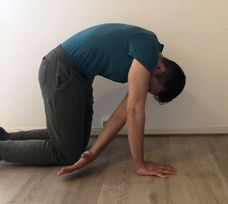
Adding a trunk rotation in the camel position increases the stretch on one side of the paraspinal muscles. This is great for relieving the tension on one side. With right-sided spine pain, use the right arm to stretch.
3. ‘Sitting on heal’
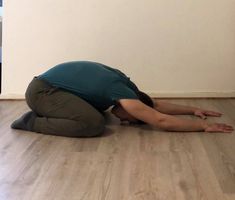
One of the greatest stretches for paraspinal muscles. Try to reach forward with hands as much as you can. Hold for the 60s. Additionally, you can feel the stretch in the groin area, shoulder and lats.
4. ‘Sitting on heal’ – One Side
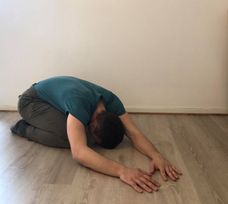
Try to reach to one side with your hands, as much as you can. By focusing on the one side, you increase the stretch on the contrary paraspinal muscles. When you go with your arms to the right side, you stretch the left side of spine muscles and lat. This is great if you feel the need to stretch one side more. Hold for the 60s.
5. Trunk Rotation
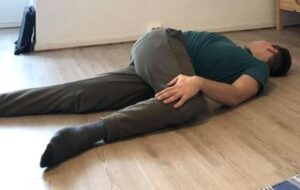
Start with lying on your back and rotate one leg until your knee is on the ground. Try to maintain the opposite shoulder on the ground also. You can feel immediately tension relief in the lower back. Hold for the 60s.
6. Hip Flexion
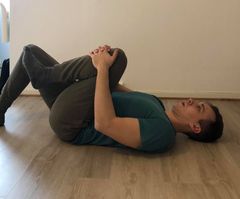
Lay down on your back and pull one knee to the chest with your arms. Hold for the 60s. Another way to do it is to pull your both knees to the chest and to spread the knees as much as you can. Stretching the hip flexors and groin muscles contributes to relaxation in the spine overall. Because of that, you should practice daily hip flexion stretch.
7. Lying Gluteal Stretch
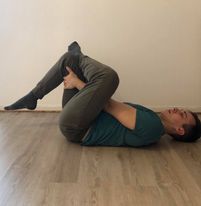
Lay down on your back with crossed legs and pull the legs to the chest. You should feel the stretch in the gluteal area. Stretching the gluts will give further relaxation to muscles around the spine. Hold for the 60s.
8. Seated Trunk Flexion
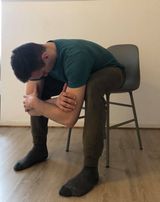
Bending your body forward while seated will stretch the paraspinal muscle group and groin muscles. Seated variation is great for going slowly into the stretch since you can adjust the intensity easily. Hold for the 60s.
9. Seated Trunk Side Flexion

Bending your body to one side gives more stretch on the opposite side of the spine. Suitable for one-sided pain and tension in the spine. Hold for the 60s.
10. Lying Hip Rotation
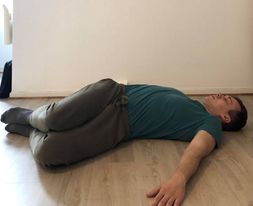
Rotating the hips while keeping your knees and ankles in contact is an excellent way to relieve tension in the lower back and paraspinal muscles. This is the basic version. Try 10-12 repetitions.
11. Lying Hip Rotation – one leg
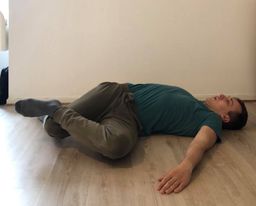
Rotation with crossed legs is an easy way to increase the lower back stretch and tension relief. You will develop the hip range of motion simultaneously. Try 10-12 repetitions.
12. Hamstring Proximal Stretch
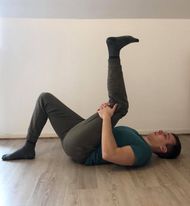
Lay down on your back, pull one knee to the chest and try to extend the knee as much as you can. Hold in that position for the 60s.
13. Straight Leg Raise
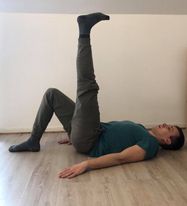
Lay down on your back and lift one leg as much as you can. Try to maintain knee extension. To isolate the hamstring muscles even more, bend the other leg before going into the stretch. Hold for the 60s.
14. Adductor Stretch
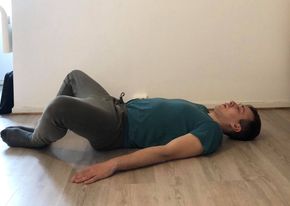
Lay down on your back and bend your knees. Hold feet together and try to move the knees to the side as much as you can. Try 10-12 repetitions.
15. Adductor Stretch One Leg
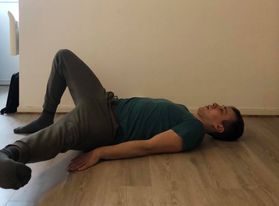
Lay down on your back and bend one knee. Then go to the side and extend the knee. Try to hold your leg in the air and repeat 10-12 times.
Thank you for reading this blog post. Start exploring other blog posts here. If you want to stay updated with our content, follow us on facebook and instagram.
More Information About Back Health
- Back hurt from being overweight – Being overweight is one of the contributing factors for lower back pain. Learn how being overweight influence lower back and how to start training without being injured.
- Hip flexors and lower back pain – How hip flexor muscle group is causing constant pressure in the lower back and few examples of proven exercises for improving the function of the hip flexors.
- Tight gluteus and lower back – Prolonged sitting and inadequate physical activity are causing tight and weak gluteus without us knowing it. Learn how to avoid lower back pain caused by tight gluteus.

